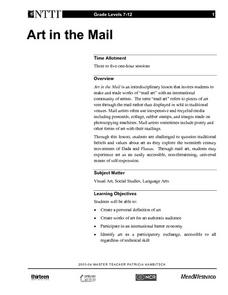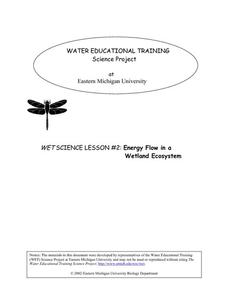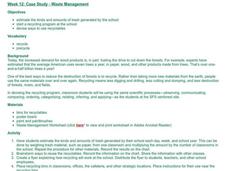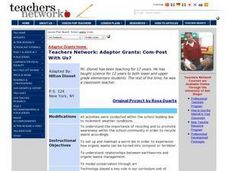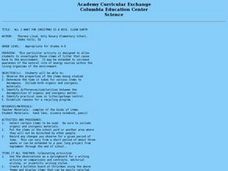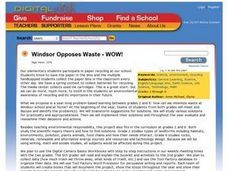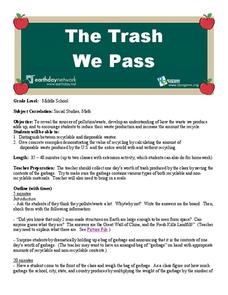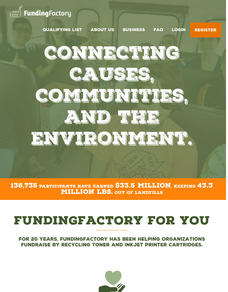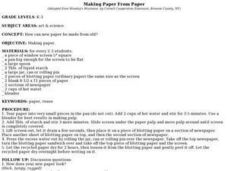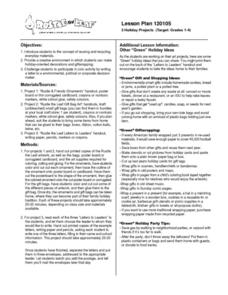Chicago Botanic Garden
Personal Choices and the Planet
How big is your footprint? Activity three culminates the series by having groups complete carbon footprint audits with people in their schools and/or around the districts. Groups then gather their data, create a presentation including...
National Park Service
Reduce Our Carbon Footprint, Let’s Compost!
Roll up your sleeves and get a little dirty with this elementary and middle school compost lesson. All you need is a large plastic container, a couple old newspapers, some organic waste, and a few hundred worms and you're ready to start...
Curated OER
Art in the Mail
The "mail art" phenomena was started back in the 20's with the Dada and Fluxus art movements and revitalized in the 60's. The principle of mail art, is free exchange and artistic expression. Learners study these facts and then create...
Eastern Michigan University
Energy Flow in a Wetland Ecosystem
How is energy transferred within an ecosystem? What would happen to a food web if one of the organisms was removed? Elementary or middle school ecologists examine these questions and more in a comprehensive 5E learning cycle lesson....
Curated OER
Non-Edible Recipes (art recipes)
Oh your eyes are going to pop when they see this long list of are recipes! Each of the 29 links redirect you to an art supply recipe that will help you make a number of art supplies. Doughs, paints, clay, glue, paste, and chalk are a...
Alabama Learning Exchange
The Water Cycle
Learners identify the stages of the water cycle. They listen to the book "Magic School Bus: Wet All Over," examine the Build Your Own Water Cycle website, predict and measure the amount of water in a jar for a week, and read a short play...
Curated OER
Self-Promotion
Students create "assemblage boxes" displaying representations of themselves and the importance they see in their own lives. This middle school level lesson emphasizes the art of American artist Sarah Goodridge who has success in the...
Curated OER
Waste Management
Learners set up a recycling program in their school. They first estimate the kinds and amount of trash generated and brainstorm ways to reuse the recyclables and create flyers explaining how their program will work at the school.
Curated OER
Save the Planet!
Third graders explore the Recycle City Web site. They examine ways to save the environment. They write a short interview between a news reporter and an environmental expert. They practice acting out their news report.
Curated OER
Com-Post With Us?
Students discuss the importance of reducing, recycling and reusing materials to help the environment. As a class, they create a worm bin and observe how it turns material in to compost. They use the internet to research the...
Curated OER
Save the Earth: It's Everyone's Home
Students explore how recycling helps save trees and protect the environment. For this environmental concern lesson, students color a handout of animals that live in forests. Students discuss how recycling paper can save trees and set up...
Curated OER
All I Want for Christmas is a Nice, Clean Earth
Students observe properties of items, determine time it takes for organic/inorganic items to decompose, identify differences/similarities between decomposition, identify practical uses in litter/garbage control, & establish reasons...
Curated OER
Garbage Routes
Students brainstorm a list of places where garbage is disposed. Working in groups, they discover through a classroom simulation how garbage can wither be recycled or hauled to a landfill. they complete the activity with a worksheet on...
Curated OER
Windsor Opposes Waste - WOW!
Students participate in paper recycling. They are taught to environmental awareness of recycling and its importance in their future. Students discuss and identify the problems of how they can minimize waste. They brainstorm suggestions...
Curated OER
Aluminum Altruism
Students explore the value of recycling. They consider the importance of giving back to their school community. They calculate their earnings using multiplication and addition.
Curated OER
The Trash We Pass
Students engage in a study of trash and how it is disposed of in the environment. They also research the impact of recycling and its effects upon the disposal amounts. Students calculate the advantages of recycling using real world...
Curated OER
Trash Disposal Choices
Learners investigate the use of landfills. In this landfill use and recycling lesson, students discuss what happens to trash and junk. They review the types of trash before categorizing a list of items they throw away each day. They...
Curated OER
The Flat Stanley Project
Students read the book Flat Stanley. In this environmental stewardship lesson, students participate in earth-friendly activities based upon the book. This lesson includes ideas such as using recycled paper to make a "paper pal."
Curated OER
Invention
Pupils discuss the importance of recycling to the environment. They classify different objects and put them into the correct recycling bin. They create their own invention out of recycled materials.
Curated OER
3-D Posters
Students work in small groups to create 3-D posters to discourage throwing trash away and encourage recycling.
Curated OER
MAKING PAPER FROM PAPER
Students tear paper into very small pieces and follow a formula to make recycled paper. They follow up with a discussion about the quality of their paper and its benefits.
Curated OER
Musical Instrument Workshop: Somerset Waste Action Programme
Students use recyclable material they bring from home to create a musical instrument. They play their instrument for the class and work as a class to play as in a band or orchestra. Students discuss recycling, and other uses they can put...
Curated OER
3 Holiday Projects
Students explore the concept of reusing and recycling everyday materials and make holiday-oriented decorations and gift wrapping. Letters containing environmental issues are composed and sent to political and corporate decision-makers.
Curated OER
Invention
Students create an invention, or simple machine, out of items taken from the recycling bin. Students draw diagrams of their proposed inventions, then create simple machines.




